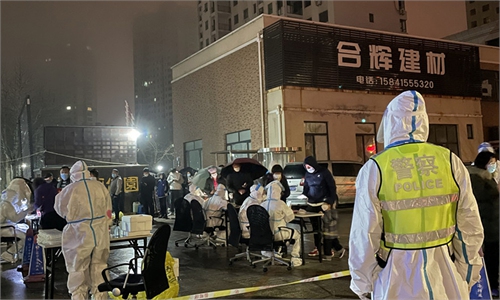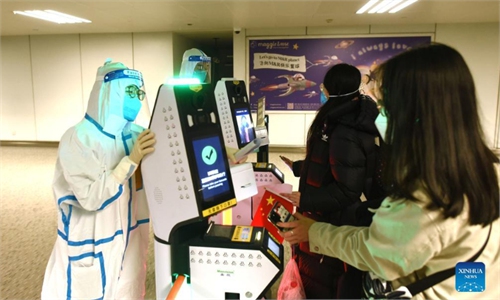China shortens quarantine for close contacts & intl arrivals from 14+7 to 7+3; adjustment ‘not a relaxation but more accurate’

Beijing airport Photo: VCG
Close contacts of COVID-19 infected patients and people entering China from overseas will undergo shorter quarantine period. The time has been reduced from 14 days of collective quarantine and another seven days of home health monitoring to seven and three days respectively, the Joint Prevention and Control Mechanism of the State Council announced in an updated epidemic prevention announcement on Tuesday, adding that the measure is not a relaxation of dynamic zero-COVID policy, but it is simply aimed at more accurate and scientific prevention, said officials in a press conference following the announcement.
The guidebook was introduced at Tuesday's press conference held by the Joint Prevention and Control Organization of the State Council. Mi Feng, spokesperson for China's National Health Commission (NHC), said at the conference that the updated version still upholds the dynamic zero-COVID policy, but has taken into consideration the characteristics of the Omicron variant, which has become dominant across the country.
Officials added that the cutting down quarantine time is based on studies which suggest the incubation period for Omicron is mostly two to four days, and the vast majority of infection cases can be detected within seven days. Therefore, the new measures will not increase the risk of virus spread.
Apart from a shortening of quarantine, the new prevention instructions also specified the standards of COVID risk classification, in response to an unclear classification of areas adopted nationwide.
The instructions increased the frequency of nucleic acid testing for people in occupations that involve higher risks of infection, and added antigen tests as supplement to the routine screenings.
It also asked big cities to draw frequency and scope of nucleic acid test based on judgment of the infection risks and transmission chains, as more than a dozen Chinese cities canceled or reduced the frequency of regular testing as outbreaks were successfully curbed.
Lei Zhenglong, deputy head of the NHC's Bureau of Disease Prevention and Control, said at the conference that the adjustments were based on an improving situation of epidemic in the past month despite an ever more complex prevention environment and mounting pressures of virus import and domestic flare-up.
The short incubation period and fast transmission of the Omicron variant were also taken into account.
Seven Chinese cities including Dalian, Suzhou, Qingdao and Guangzhou have started a trial phase from April to May adopting the new measures, Lei added.
The Joint Prevention and Control Mechanism working team said it will dispatch special groups to each region to supervise the implementation of the playbook, making sure that inconsistent behaviors are removed.
In response to public calls on the supervision of deeds that over-simplify COVID restrictions and adoption of one-size-fits-all approach, Mi said that a public message board has been opened on the home page of the official website of the NHC, and that authorities will take it seriously, organize and summarize the suggestions, and urge locals to rectify problems as soon as possible. Violations will be made public.


